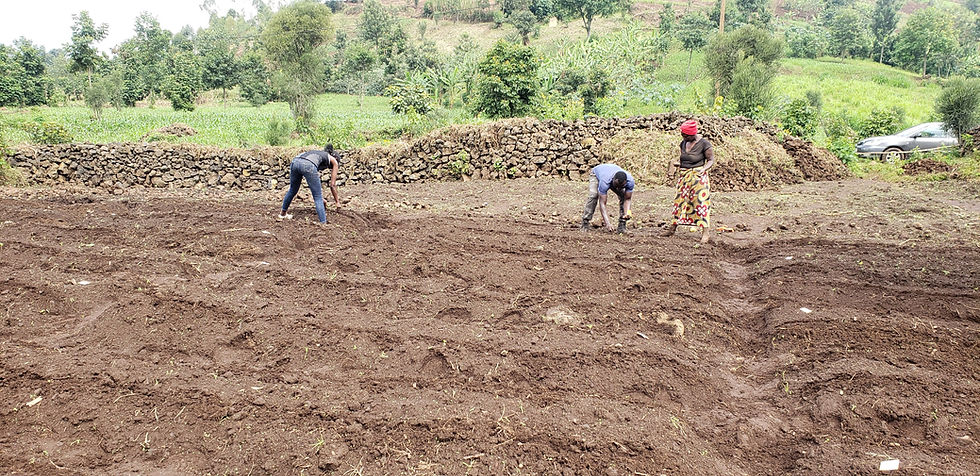I Still Call Myself a Farmer
- Cedric Habiyaremye

- Aug 29, 2025
- 4 min read

People often ask why I still call myself a farmer. With the titles I’ve earned and the rooms I now walk into, conference halls, policy forums, and polished boardrooms, the question usually comes with curiosity. Some assume I’ve outgrown farming, that it’s a chapter behind me. Others think it’s just a poetic flourish, a nostalgic nod to my roots, or maybe even a clever branding move. But the truth is far more straightforward and far deeper. I call myself a farmer because I am one. That word carries more weight, more soul, and more truth than any other title I’ve held, except, perhaps, “Chief Executive Assistant to two very tiny but fiercely determined humans: my daughters.” That one might be the most important title of all.
Farming wasn’t something I stumbled into; it was part of me long before it became a profession. I was born into it, raised by it, and shaped by its rhythms. Before I had the words for it, I was already living it, barefoot in the soil, learning from the land, absorbing its quiet teachings. My community didn’t mark time with clocks. We measured it with the rains that brought hope, the harvests that brought relief, and the lean seasons that taught us to endure. Later, when I had the chance to choose my path, I chose agriculture, not because it was easy, but because I had seen hunger with my own eyes, and I believed the land held part of the answer. Farming wasn’t just familiar; it was purposeful.
In the slow, steady work of planting, weeding, and waiting, I came to understand life’s most enduring truths, not through speeches or books, but through calloused hands, dry earth, and early mornings filled with both promise and uncertainty. Farmers live at the intersection of effort and surrender. They pour themselves into the land, preparing, planting, and nurturing, but they don’t command the rain. They can’t reason with drought or negotiate with pests. They do everything they can, knowing the outcome isn’t fully in their control. They live with a humility born of necessity, and from that humility grows a steady wisdom; one the world needs now more than ever. It’s not the kind of wisdom that shows up in headlines. It’s the kind that takes root slowly, the kind that grounds you through change and reminds you what truly matters.
Even now, in rooms far from the fields, where suits replace overalls and screens replace skies, I still lead like a farmer. I still think like a farmer. Because the land taught me how life actually works. It taught me that pressure doesn’t speed up growth. You don’t yell at seedlings to hurry up. Growth takes time. You don’t blame the crop for not being ready. Most things die from over-managing, not neglect. You don’t keep pulling up a plant to check if it’s growing. Even transplanting has its right season. Farming taught me to match effort to context: choose the right seeds for the soil you have. It taught me that steady care matters more than one-time heroics; water, fertilize, and return tomorrow. It taught me to protect energy; pull the weeds that drain life from what’s trying to grow. And most of all, it taught me that you don’t control the seasons. You can only prepare to meet them.
These aren’t just agricultural insights. They’re truths that shape how I try to live, how I strive to lead, how I show up for my children, and how I care for the dreams entrusted to me. In a world obsessed with speed instead of stillness, with output instead of patience, and with performance instead of process, these truths have become my compass. So when I introduce myself, especially in rooms where titles shine and roles stack up, I start with “farmer.” Not to downplay the other parts of me, but to ground them. That word holds my beginning, my values, and my way of moving through the world. It reminds me of the people whose names may never appear in headlines but whose hands feed the world. It anchors me to the dignity of work that often goes unseen. It connects me to the beauty that takes time, to the slow and meaningful unfolding of things that matter.
We live in a time that glorifies the finish line but forgets the furrows. We chase speed, recognition, and instant results. But the farmer in me knows that not everything is meant to be rushed. Soil needs rest. Seeds must break before they rise. Some blooms take seasons before they ever show themselves. And often, the most meaningful transformation happens in the quiet, underground, unnoticed, slowly reshaping the landscape, one root at a time.
So yes, I still call myself a farmer, because I am one, and I’m proud of it. It keeps me grounded. It reminds me that leadership is stewardship. It teaches me to show up with presence, to trust the process, and to believe in harvests I may never live to see. And I say it proudly because I want my children and yours to know that the world is still held together by those who quietly show up each day, who build with care, who grow what others depend on, and who dare to plant seeds for a future beyond themselves.
To those who farm the land, and to those who are farming dreams, visions, and communities, I see you. May we tend what truly matters. May we trust what’s unseen. May we grow slowly, deeply, and well. And may we always remember: let things grow. Just don’t forget to tend the field.










Comments